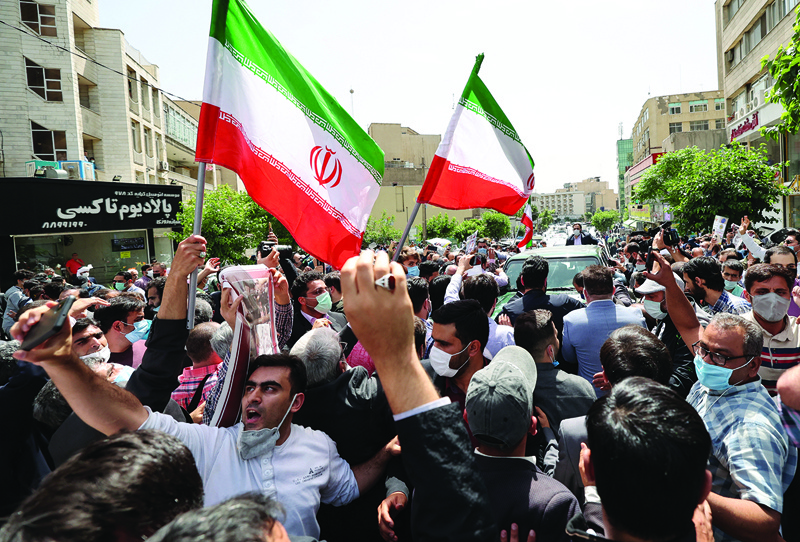 TEHRAN: Supporters of Iran's former president Mahmoud Ahmadinejad gather outside the Interior Ministry headquarters in the capital Tehran yesterday as Ahmadinejad arrives to register his candidacy to run again for president in the elections scheduled for June. – AFP
TEHRAN: Supporters of Iran's former president Mahmoud Ahmadinejad gather outside the Interior Ministry headquarters in the capital Tehran yesterday as Ahmadinejad arrives to register his candidacy to run again for president in the elections scheduled for June. – AFP
TEHRAN: Iranian ultra-conservative ex-president Mahmoud Ahmadinejad put his name forward yesterday as a candidate to succeed moderate President Hassan Rouhani in elections next month. The 64-year-old populist was applauded by several dozen supporters as he arrived at the interior ministry to submit his application. "Millions of people across the country have invited me to stand for election, and even ordered me to come here to register, placing a heavy responsibility on my shoulders," Ahmadinejad said. The build-up to June 18 polls comes as Iran and world powers wrangle over reviving a 2015 nuclear accord, from which the US withdrew unilaterally in 2018, reimposing crippling sanctions.
Hopefuls have until Saturday to register, and will then be vetted by the conservative-dominated Guardian Council before a list of approved candidates is published by May 27, after which campaigning begins. But Iranian media considers Ahmadinejad's chance of being approved are close to zero. He said that if he is not approved, he will "not participate" in the election, either by backing a candidate or voting. Ahmadinejad claimed, as he has often done in recent years, that the Iranian people have lost confidence in the country's authorities. He added that he considered the upcoming election "perhaps the last chance" to save the Islamic republic in the face of "very sensitive" challenges, both domestic and international.
Fiery rhetoric
Iran's president from 2005 to 2013, Ahmadinejad had to stand down at the end of two consecutive terms as per the constitution. His successor Rouhani will face the same obligation in June. Ahmadinejad's presidency was marked by fiery rhetoric against Israel and deep tensions with the West, notably over Iran's nuclear program which he enthusiastically championed.
Reinforced by UN Security Council sanctions, punitive measures cost Iran's economy billions in vital oil revenues and foreign investment, leaving the country struggling with raging inflation, high unemployment and a depreciated currency. Hailed by Iran's poor as their champion but viewed as a bogeyman by the West, he was blamed by some analysts for the country's economic problems. His hotly disputed re-election victory over key challenger Mir Hossein Mousavi in 2009 triggered one of Iran's worst political crises.
Deadly protests swept Tehran after the vote, which the opposition says was rigged. Ahmadinejad also faced the wrath of his own supporters over some political moves, with some rivals labeling him a "loose cannon". His diatribes against Israel-including saying it was doomed to be "wiped off the map" and that the Holocaust was a "myth"-even sparked rebukes from fellow Iranian conservatives for damaging Iran's international standing.
But for many Iranians, the blacksmith's son was seen as a devout and hardworking man of the people, a reputation he built on with huge spending programs and tours of the rural heartland during his first term. The populist ex-president had also put his name forward for the 2017 presidential election, against the advice of the country's supreme leader, Ayatollah Ali Khamenei.
His candidacy was rejected by the Guardian Council, an unelected body dominated by conservatives and responsible for overseeing the presidential polls. Ahmedinejad has continued to be a thorn in the side of authorities, demanding "the immediate holding of free presidential and parliamentary elections-without their being engineered by the Guardian Council and without interference by military or security bodies. He has also set up a profile on Twitter-a platform his administration banned in 2009 -- preaching "Freedom, justice and love," focused on global issues like ending racism and inequality. - AFP
.jpg)



